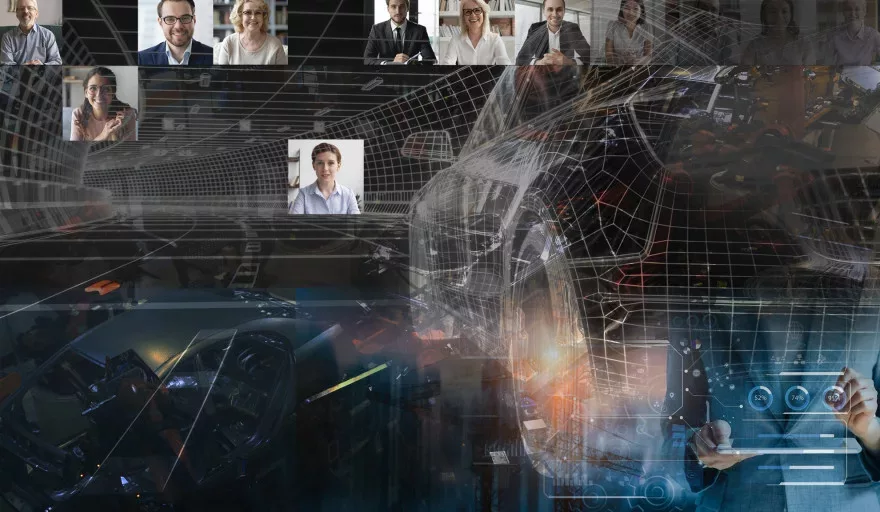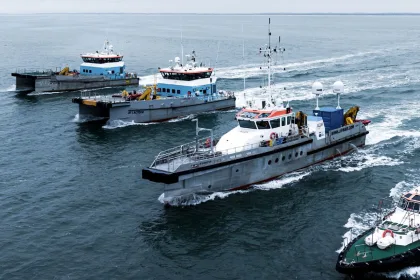Chris Mason, CEO at FISITA explores the continued transition of the automotive and mobility industry.
EVOLUTION NOT REVOLUTION
by Chris Mason, CEO, FISITA
In response to the COVID-19 stay-at-home governmental policies and recommendations in 2020, many businesses around the world were forced to quickly develop and adapt strategies to accommodate remote working and virtual engineering capabilities. Established working practices which had evolved over decades were challenged and changed as reactive measures sustained business operations. As time progressed, many of these near-term measures evolved into clear, long-term efficiencies. New methods and pathways were created and embedded within the workplace, and for those in automotive engineering, this meant everything from research and design to product development and testing.
As pandemic restrictions ease around Europe, automakers, suppliers and start-ups are exploring how they can make the transition into stable and sustainable business operations within a changing professional and societal environment. With this change, they must also address the new challenges and opportunities within the workplace, including how automotive and mobility engineers will be motivated and the possible impacts this shift will have on the long-term change in human behaviour. Automotive world leadership is adapting and preparing not only for the near-term, but also for a future in which sustaining efficiency in a rapidly changing operational and cultural environment will impact every organisation in this arena – automakers, suppliers and start-ups. Much like the shift of the automotive industry into a mobility- and technology-driven ecosystem, the workplace must quickly adapt into a more fluid and progressive process that benefits all. FISITA itself has evolved to align with the rapid evolution of the industry, most recently through its ‘Workplace Evolution’ report that explores the impact of digitalisation on the future of work and leadership.
THE IMPACT OF TECHNOLOGY
Despite ground-breaking innovation across the industry such as intelligent safety systems and electrification, software for virtual meetings, company-wide and team collaboration tools, webinar platforms and virtual conferencing architectures have driven development in recent years. For example, many European automakers and suppliers are in constant communication with countries such as China and the US, to collaborate, discuss and share knowledge on emerging innovation for new vehicles. Without this seemingly simple technology, many businesses would have struggled to make any progress, slipping to the back of the highly-competitive global market. Today, FISITA’s European members, such as Faurecia, Qualcomm and Bosch, are all taking steps to realise this vision, sharing their knowledge and understanding of the changing landscape.
The novelty lay not in these tools, but in the realisation of how much work could be done quickly, efficiently and productively via reliable and sophisticated online and remote working arrangements. As remote working has evolved, unanticipated upsides have emerged for the industry, and these will continue to be a driving force. Our own organisation identified this shift early on, transforming the way we interact with our members through a digitally connected international community. Enabling industry influencers and technical specialists to continue to debate, discuss and share is critical to any business’ success and something the mobility technology community in particular thrives on.
Conferences were also switched from physical to online events, adjusting traditional conference revenue streams, but also reducing delegate and speaker travel costs and time away from their core business. Webinar demand increased rapidly, and anecdotal evidence suggests online meetings democratised participation, encouraging and increasing engagement. Work was completed more efficiently, and business continuity maintained. FISITA itself used this shift to transform the organisation to better connect its members across the world, which saw a boost in online events and working groups, driving discussion and collaboration across Europe – and beyond.
Clearly, there have been downsides. Businesses faced upheaval, management time was diverted into crisis mode, and companies incurred costs – especially in needing to ship the tools to enable staff to work from home. Staff, too, found the transition difficult, with the lack of personal human interaction a commonly cited challenge, as employees realised the value of face-to-face work. However, companies and staff have adapted to the new way of working, communicating and, ultimately, getting the job done.
THE ‘NEW NORMAL’
Even as restrictions ease, the COVID-19 pandemic continues to challenge European businesses beyond expectations. These challenges have added complexity to a vertical arrangement where innovation, technology deployment and product development are accelerating, and traditional relationships are rapidly evolving between automakers and suppliers.
In recent years, pressure has been increasing across the international engineering community to adapt to changes in employment, recruitment and retention, team working, continuous learning, personal development, relationships and sustainable professional motivation. As such, it is vital that an international community is established to ensure progress for every level of the business. Answering the call, FISITA’s community, which consists of OEMs, suppliers, start-ups, academia and governing bodies, has created the infrastructure for seamless and valuable knowledge sharing across peer groups within the industry.
For organisations to remain relevant, the way forward is for businesses to reinvent how they organise and work. Business, society, and people must come together in harmony to find solutions in the ‘new normal’. The way businesses operate will have to alter; today’s rigid structures must change. The focus should be on purpose, agility and enabling teams to discover solutions at ground level. It is also essential to keep pace with technology, and to attribute importance to compliance and data security with the right infrastructure systems in place.
Leadership culture needs a major rethink too, and rigid hierarchies will need to be replaced with flatter, role-based, or community-based structures. Greater levels of transparency on business decisions enable staff to add value to an organisation. Sustainability matters – so in that respect business should support associates to take up socially relevant causes by offering flexible working models.
We need to reflect not only on how we get back to ‘normal’, but also understand how we can deal with the ‘new’ normal. To find out the answers, we here at FISITA started asking ourselves: “Is enough of today, good enough for the future?”






























